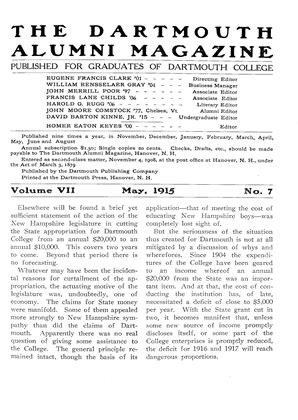of the action of the New Hampshire legislature in cutting the State appropriation for Dartmouth College from an annual $20,000 to an annual $10,000. This covers two years to come. Beyond that period there is no forecasting.
Whatever may have been the incidental reasons for curtailment of the appropriation, the actuating motive of the legislature was, undoubtedly, one of economy. The claims for State money were manifold. Some of them appealed more strongly to New Hampshire sympathy than did the claims of Dartmouth. Apparently there was no real question of giving some assistance to the College. The general principle remained intact, though the basis of its application—that of meeting the cost of educating New Hampshire boys—was completely lost sight of.
But the seriousness of the situation thus created for Dartmouth is not at all mitigated by a discussion of whys and wherefores. Since 1904 the expenditures of the College have been geared to an income whereof an annual $20,000 from the State was an important item. And at that, the cost of conducting the institution has, of late, necessitated a deficit of close to $5,000 per year. With the State grant cut in two, it becomes manifest that, unless some new source of income promptly discloses itself, or some part of the College enterprises is promptly reduced, the deficit for 1916 and 1917 will reach dangerous proportions.
Reducing the College enterprises can mean one thing only: that is* reducing the teaching and administrative force either in personnel or in salary scale. The injury to the College that would result from such procedure is impossible to calculate. It would proba- bly be serious, so serious that' the trustees have refused to consider it.
It remains to find new sources of income. And here the large opportunity of the recently established Alumni Fund becomes apparent. It provides, ready at hand, the machinery whereby the alumni may, without great inconvenience to themselves, materially aid their College. The College today faces a crisis more grave than the immediate financial aspects of the case would imply. Fundamentally the test is of the genuine loyalty of the alumni: their willingness to join vigorously in a movement to relieve Dartmouth of an immediate embarrassment and to help open for the old College wider avenues of power and usefulness in the future.
The last Prom Week impends. To make way for the event Spring has developed over-heated days, whose genial breath has blown wide the blossoms and garbed the trees in premature verdure. A hectic April is usually followed by a frosty May. The month to come will be fully capable of merging Prom and Carnival in drifts of untimely snow.
In some undergraduate quarters there is still a tendency to view the passing of Prom with grief. It is reported that the sophomores will strive to reduce Winter Carnival to its bare althletic bones, guaranteeing early bed and hard study for the entire student body during that erstwhile joyous period, provided the Maytime Prom may be preserved. Whether the Outing Club has been consulted in the matter is not altogether apparent. In any case the guarantee would seem impossible of fulfilment beyond the first year, if at all.
Just what the faculty will do about it, there is, of course, no telling. The chances are, however, that it will decide ance of the position originally taken. The College reputation as a seat of learning could hardly withstand for any considerable period two such ecstatic weeks as this year of grace 1915 has provided. Byway of insuring a fit termination, the Prom this year will begin early and end late. All reasonably level spaces within a radius of some miles of Hanover have, it would appear, been reserved for dancing, which will be the usual order of the day as well as of the night, and any other time that may in- tervene. The committee in charge hopes to arrange matters so that all those who come on Tuesday and keep right at it until Saturday midnight will be too tired to go home for several subsequent days. The real test of a good Prom being the complete exhaustion of the participants, this is a worthy ambition.
Finally, may it be "The Prom is dead; long live the Carnival!"
 View Full Issue
View Full Issue
More From This Issue
-
 Article
ArticleFOOTBALL AT DARTMOUTH
May 1915 By Howard Murray Tibbetts '00 -
 Books
BooksThe Real Turk
May 1915 By C. H. H. -
 Article
ArticleTHE REVIEW
May 1915 By Wilder D wight Quint '87 -
 Class Notes
Class NotesCLASS SECRETARIES
May 1915 -
 Article
ArticleDARTMOUTH AMBULANCE CORPS
May 1915 By MABEL T. BOARDMAN -
 Article
ArticleTHE CHRISTIAN ASSOCIATION'S EXHIBIT
May 1915








